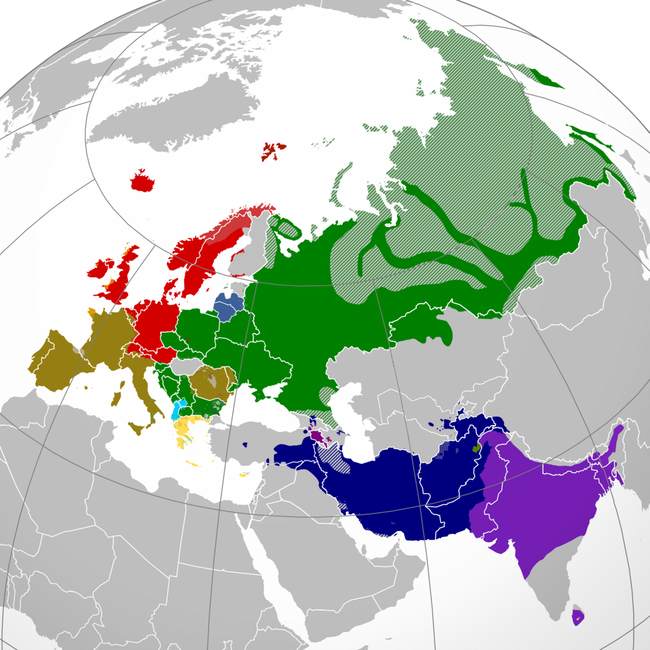I have been listening to podcasts in the late evening for years. It is a good way to wind down, and I admit I usually fall asleep with them on in the background.
This leads me to listen to each several times to catch up to where I fell asleep, but that's fine. YMMV.
I have mentioned several podcasts in previous versions of Things I Like, such as Mike Duncan's, Dan Carlin's, and David Crowther's, but another one fits into my must-listen category: Kevin Stroud's The History of English.
I know that to many of you, the thought of listening to a guy describe the evolution of a language may seem quite dull, but let me assure you that the opposite is true. Now, I admit that the history of the language is filled with fewer fascinating tales of interesting people doing amazing things, but the story of the language itself is fascinating and quite surprising if you don't know the backstory.
That is particularly so because the history of English is deeply entangled with history itself. You can't understand where our language came from without learning about the waves of invaders who populated England and drove the Celts to the margins. Angles, Saxons, Vikings, and French invaders created English and modern England. You learn about it all.
If you look at a map and ask yourself: what are the most widely spoken languages worldwide, you would expect the answer to be "Mandarin." But it is English by a decent margin. Most of those speakers use English as a second language, but that is a tale in itself. The British Empire and then the Industrial Revolution made English the new "Lingua Franca."
Ironically, English almost disappeared as a language in the Early Middle Ages. After the Norman conquest, French became the language of law and government, and it looked like English might be on the way out. Only the peasants spoke it, and many of the ruling class of Britain couldn't understand a word of it.
Now, 5x as many people speak English as French. Go Peasants!
English evolved from a proto-IndoEuropean language spoken by a few tribes around the Caspian Sea to the largest of a family of languages that almost 50% of the world's population speaks. Go back far enough and you find English and Sanskrit derived from the same root.
Amazing.

What makes English nearly unique among the world's languages, which mostly developed by evolving away from a common root, creating divergences between languages that used to be mere dialects, is that English has been built by convergence.
The Romance languages (e.g., Spanish, French, Italian, Portuguese) are all derivative from Latin (Romance/Roman), having evolved away from each other since the fall of the Empire. English, on the other hand, has freely borrowed from Latin, Greek, French, German, Swedish, Norwegian, and Spanish. English evolved by borrowing from other languages, while the Romance languages evolved by diverging from Latin, splintering.
Other languages borrow from English now, but English has been doing it since it evolved from Old English.
Old English is almost unrecognizable, and fewer words we use today than you would imagine come from that time. But many of our most-used words are of specifically Old English origin or modernized variations. Words like "brother" and "sister," for instance, go back to the origins of the language. Nothing Latin or Greek there. The names of animals, too, go to the beginnings of the language, because they are so basic.
The English word Cow, for instance, is "Vache" in French. But our word for the meat of a cow--beef--is derived from the French bœuf. Peasants raised cows; the elite ate bœuf.
One of the reasons we have so many synonyms is that many words have entered the language from different origins; there will be one derived from old English, one from French, and one from Greek, all of which entered the language at different times and for different reasons. This is also why so many synonyms will describe the same thing, but one word is considered fancy while the other sounds more basic or crude.
The "fancy" version is likely French-derived, and the cruder one is derived from Old English or something Germanic. Legal language is often derived from Latin because Latin was the language of law for centuries post-Norman conquest. Greek-derived words entered the language during the Renaissance with the rediscovery of the Classics.
Chances are good that the more educated you are, the more you use words derived from Latin, Greek, and French because these are the words we still unconsciously consider "cultured." Thank William the Conqueror for that one.
The History of English provides a lot of "Aha!" moments. Mysteries of the language suddenly make sense, and you absorb a lot of political and economic history along the way since political history drives the adaptation of the language. You will learn why spelling is so weird in English and that "Ye Olde" is actually not pronounced "Ye Old," but "The Old." The "Y" you think you see is actually a letter we don't use anymore called "Thorn," and was pronounced like we do "Th" today.
This podcast will certainly not be to everybody's taste since it seems so geeky, but you might be surprised to find the nuggets you pick up along the way. There is something satisfying about things you often wondered about suddenly making sense.
One last thing: I also started listening to John McWhorter's The Story of Human Language, and he gave me permission to admit this: I don't enjoy Shakespeare in the original Early Modern English. You have to interpret so much of it, so you are always trying to catch up. McWhorter, a linguist, admitted he couldn't stand watching Shakespeare in the original either.
Thank God. Even a linguist can admit to wanting Shakespeare modernized. I feel better.








Join the conversation as a VIP Member